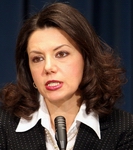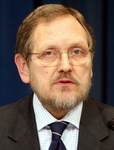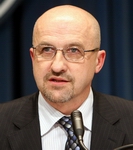Q:
A:
Alarming energy situation in Serb enclaves in Kosovo
Belgrade,
2 February 2006
Head of the Coordinating Centre for Kosovo-Metohija Sandra Raskovic-Ivic said today that the government has decided to ask UN Secretary General Kofi Annan for help in solving the problem of electrical energy supply to Serb enclaves in Kosovo-Metohija.
At a press conference following the government session, Raskovic-Ivic said that Prime Minister Vojislav Kostunica and Serbian President Boris Tadic will send a letter to Annan tonight to inform him that Serb enclaves in Kosovo-Metohija were illegally disconnected from landline and mobile phone networks.
She explained that authorities in Serbia are forced to address Annan in this way because provisional institutions in Kosovo only pay attention to ethnic Albanian concerns in the province thus exerting pressure on the Serbs which can ultimately result in ethnic cleansing of the province.
Raskovic-Ivic said that at the meeting with UN Secretary General's Special Envoy for Economic Reconstruction Joachim Ruecker, she explained that Serbia did not disable electricity transfer from Bulgaria to Kosovo as he had claimed.
She recalled that in October 2005, there was an agreement concerning the supply of electricity to Serb enclaves and several possibilities were discussed, but that talks with representatives of UNMIK and of Albanian provisional institutions were put off on several occasions.
She explained that authorities in Serbia are forced to address Annan in this way because provisional institutions in Kosovo only pay attention to ethnic Albanian concerns in the province thus exerting pressure on the Serbs which can ultimately result in ethnic cleansing of the province.
Raskovic-Ivic said that at the meeting with UN Secretary General's Special Envoy for Economic Reconstruction Joachim Ruecker, she explained that Serbia did not disable electricity transfer from Bulgaria to Kosovo as he had claimed.
She recalled that in October 2005, there was an agreement concerning the supply of electricity to Serb enclaves and several possibilities were discussed, but that talks with representatives of UNMIK and of Albanian provisional institutions were put off on several occasions.
Serbian Minister of Energy and Mining Radomir Naumov said that the situation concerning the supply of electric energy to Kosovo is "tragic".
He said the Serbian government proposed an emergency solution to this problem. Namely, it suggested that Serbia be allowed to supply 50 million kilowatt-hours to the province for two months with the risk that this amount of electricity will not be paid, but the proposal was not accepted.
He said that the government has passed a decision at its session today determining Serbia's energy balance for 2006, in line with the Law on Energy, which contains plans for the necessary amount of energy to be produced in a year.
He added that the government has also adopted the Information on joint investment and completion of construction works of the "Kolubara B" thermoelectric power plant.
He said the Serbian government proposed an emergency solution to this problem. Namely, it suggested that Serbia be allowed to supply 50 million kilowatt-hours to the province for two months with the risk that this amount of electricity will not be paid, but the proposal was not accepted.
He said that the government has passed a decision at its session today determining Serbia's energy balance for 2006, in line with the Law on Energy, which contains plans for the necessary amount of energy to be produced in a year.
He added that the government has also adopted the Information on joint investment and completion of construction works of the "Kolubara B" thermoelectric power plant.
Serbian Minister of Agriculture, Forestry and Water Management Ivana Dulic-Markovic said that today the government reached several decisions that are highly important for prospective investors in the agriculture in Serbia.
Dulic-Markovic said that the newly adopted documents refer to distribution and use of incentive funds for investment in agriculture and modernisation of villages in 2006.
In 2006, a sum of 2 billion dinars has been earmarked for supporting investment in livestock breeding, building up storage facilities and procuring agricultural equipment and mechanisation, said Dulic-Markovic.
Serbian Minister of Economy Predrag Bubalo pointed out that his ministry is continuing work on initiatives to begin the privatisation process of public information companies.
Initiatives have begun for the privatisations of the information centre in Kula, the information centre Apolo in Novi Sad and Despotovac radio-station, the minister said.
Dulic-Markovic said that the newly adopted documents refer to distribution and use of incentive funds for investment in agriculture and modernisation of villages in 2006.
In 2006, a sum of 2 billion dinars has been earmarked for supporting investment in livestock breeding, building up storage facilities and procuring agricultural equipment and mechanisation, said Dulic-Markovic.
Serbian Minister of Economy Predrag Bubalo pointed out that his ministry is continuing work on initiatives to begin the privatisation process of public information companies.
Initiatives have begun for the privatisations of the information centre in Kula, the information centre Apolo in Novi Sad and Despotovac radio-station, the minister said.
Concerning the Serbian Development Fund, Bubalo said that the Serbian government adopted the programme of the fund for 2006.
Bubalo recalled that according to the changes introduced earlier in the Law on the Serbian Development Fund, this fund and predominantly socially owned companies are no longer financed by budgetary means of the republic.
According to Bubalo, since financial discipline has been raised to a much higher level, even without the budgetary funds, in 2006 the Serbian Development Fund will be able to grant loans to companies in total value of 9 billion dinars. This is an amount three times higher compared with 2005.
Economic entities from underdeveloped municipalities, which make up one third of GDP, will be able to procure loans amounting to 80% of the total value of the project they are applying with, with a one percent interest rate, said Bubalo.
At today's session, the Serbian government also passed Information on issuing approval for signing a loan contract between Erste Bank and the Serbian Development Fund.
The Erste Bank Group privatised Novosadska Bank and as a sign of good will offered the Serbian Development Fund a €40-million loan. Loan conditions are highly favourable, with a 7 year repayment period, one-year grace period and a 4.5% annual interest rate. These means will exclusively be used for financing export, Bubalo explained.
He also said the government adopted a draft programme on the distribution and utilisation of funds for microloans intended for employment programmes in 2006. For this purpose, the government has set aside one billion dinars.
Bubalo recalled that according to the changes introduced earlier in the Law on the Serbian Development Fund, this fund and predominantly socially owned companies are no longer financed by budgetary means of the republic.
According to Bubalo, since financial discipline has been raised to a much higher level, even without the budgetary funds, in 2006 the Serbian Development Fund will be able to grant loans to companies in total value of 9 billion dinars. This is an amount three times higher compared with 2005.
Economic entities from underdeveloped municipalities, which make up one third of GDP, will be able to procure loans amounting to 80% of the total value of the project they are applying with, with a one percent interest rate, said Bubalo.
At today's session, the Serbian government also passed Information on issuing approval for signing a loan contract between Erste Bank and the Serbian Development Fund.
The Erste Bank Group privatised Novosadska Bank and as a sign of good will offered the Serbian Development Fund a €40-million loan. Loan conditions are highly favourable, with a 7 year repayment period, one-year grace period and a 4.5% annual interest rate. These means will exclusively be used for financing export, Bubalo explained.
He also said the government adopted a draft programme on the distribution and utilisation of funds for microloans intended for employment programmes in 2006. For this purpose, the government has set aside one billion dinars.














